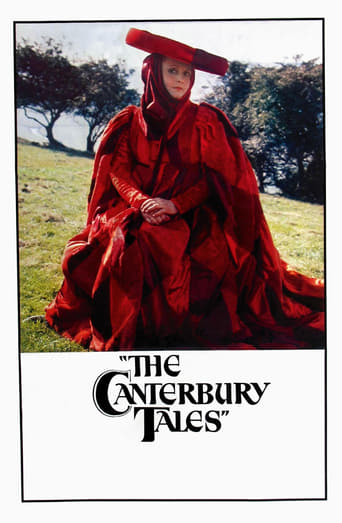philosopherjack
The last scene of Pasolini's wondrous Canterbury Tales emphasizes the narrative as an end in itself - "here end the Canterbury tales, told only for the pleasure of telling them" - and this reflects the film's sense of joyous tumble, one narrative often almost subliminally moving into another. But there's also something relentless about it, a feeling of people lacking in any real agency over themselves, as puppets of their own desires, as tools of those whose desires are stronger than their own, of the corrupt authorities, of the angels and devils which the film occasionally depicts as walking among the living. There's carnal overdrive and naturalistic nudity galore, and of course the film carries an erotic charge, but one that leads time and again to humiliation, misery, betrayal, pain, or death, and ultimately even beyond that, to one of the most tangible visions of hell ever put on film. The film is a triumph not so much of casting in the usual sense, but of human placement - an astonishing canvas of flesh and faces, suggesting people torn directly from the Medieval earth (the matchless English-language soundtrack, if you choose that option, adds considerably to this sense, when not evoking Monty Python, not that I'm saying that's a bad thing); and whether or not the various settings are historically accurate, they likewise feel discovered rather than created. At the same time, there's no doubt we're watching a work of extreme stylization, and not just in the episode that happily channels Charlie Chaplin; characters generally seem to be addressing the camera, or the void beyond it, more than each other. Which leads back to the movie's sense of desperation, that few of its possessed characters expects more from their compulsive screwing than the most fleeting of releases. The classification of the film as part of a "trilogy of life" seems, to say the least, ironic.
rdoyle29
Pasolini follows up "The Decameron" with this adaptation of several of Chaucer's stories. Like the proceeding film, this is an extremely earthy and bawdy adaptation of the material, celebrating life's pleasures and castigating authoritarian hypocrisy. This film is mildly inferior to "The Decameron", although it's high points, including an extended homage to Chaplin and an amazing vision of hell, are higher.
KGB-Greece-Patras
This, even though it lacks a bit the wit and spirit of IL DECAMERON, which was funnier, it still manages to satisfy as you reach the end. Pasolini's perverted humor as well as some of his usual actors are here. There's full nudity, both male and female. Maybe here the erotic element is more intense so its less humorous, I am not sure. I suppose it will satisfy those who like Pasolini's humour like, say, IL DECAMERON. The copy I saw had awful dubbing - Italian language- maybe it's bad sychronisation, or something else... As far as I am concerned it is worth it alone for this special, absurd, perverted, surrealistic last scene, taking place in hell. It rulez! Some others scenes are awesome too! And of course there'e Pasolini evident dislike of church/religious dogmas.If you're not easily offended and like old films, specially European ones, give it a try, IL DECAMERON as well.
max.vermeij
In the Middle Ages, people generally did not stroll about in brightly colored, shintzy clothes. Especially not when they went on a pilgrimage, "to seek the holy blissful martyr". Roads and streets were not paved. People stank. One cannot convey that in a film, but please pay more attention to set decoration? The standard you would like to attain in that respect was set by Terry Gilliam in "Jabberwocky": shabby poor people, dirty faces, muddy streets. Or "The Name of the Rose".Besides, you can only follow this movie if you have read the Canterbury Tales first. Otherwise, it's incomprehensible. By the way, almost all Italian movies I re-view of late seem incomprehensible. I used to like Italian cinema, but its products do not seem to age well. The dialogues usually seem hollow and pretentious. One notable exception: "Kaos".




